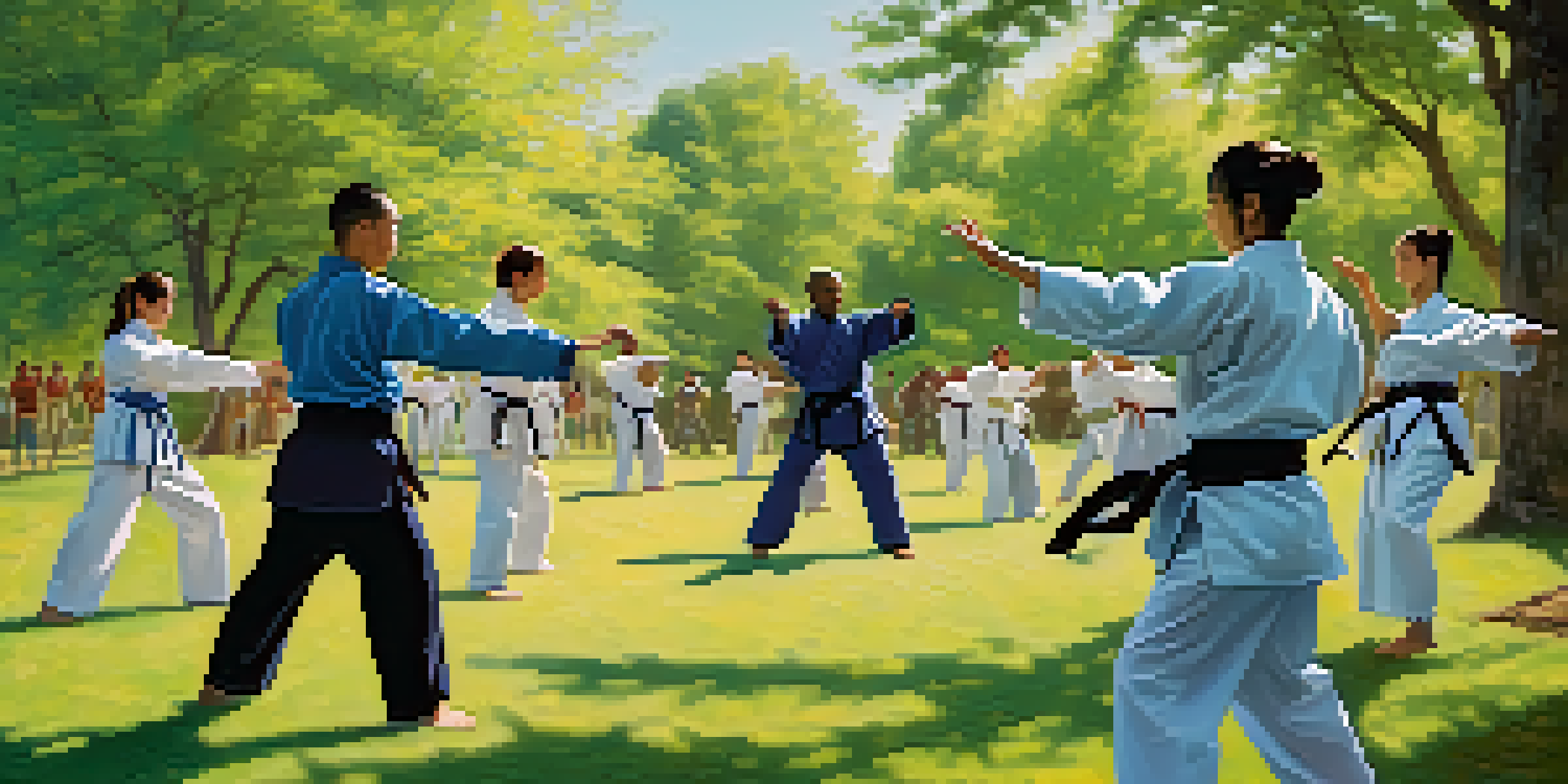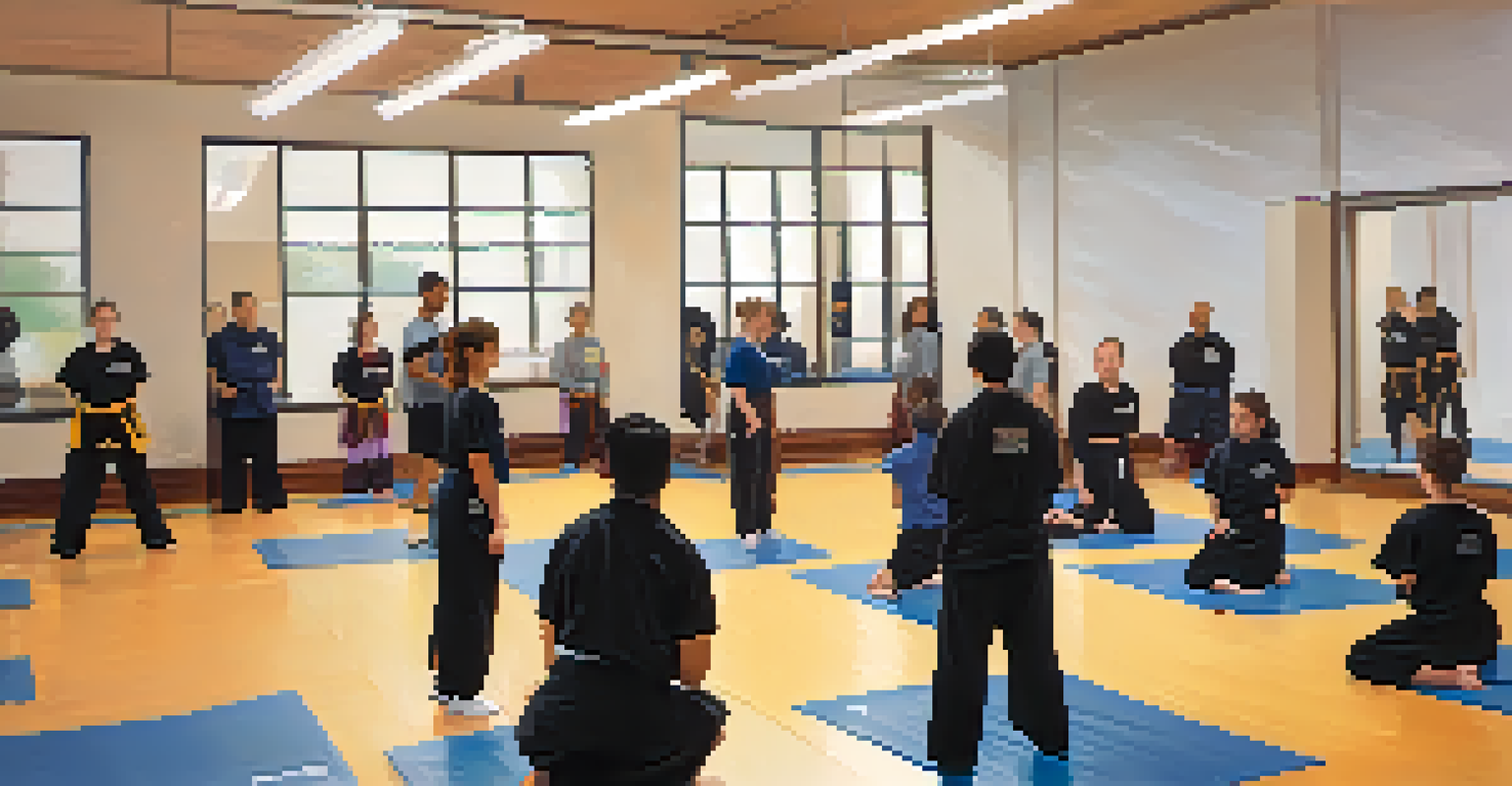Self Defense Training and Legal Implications: A Guide

Understanding Self Defense: What It Is and Why It Matters
Self-defense is the act of protecting oneself from harm in dangerous situations. It's not just about physical skills; it encompasses mental preparedness and legal awareness. Knowing how to react appropriately can make a crucial difference in life-threatening scenarios.
The best defense is a good offense.
Training in self-defense equips individuals with techniques to fend off attackers, boost confidence, and promote personal safety. For many, it’s about empowerment—gaining control over one’s own safety and well-being. This training goes beyond just fighting; it’s about understanding one’s environment.
Moreover, self-defense training helps individuals manage fear and anxiety, providing tools to de-escalate situations before they become violent. By being proactive, one can avoid confrontations altogether, contributing to a safer community.
Types of Self Defense Training: Finding the Right Fit
There are various forms of self-defense training, ranging from martial arts to modern self-defense classes. Each type offers unique benefits depending on individual goals and circumstances. For instance, martial arts like karate or judo focus on discipline and striking techniques, while Krav Maga emphasizes real-world scenarios.

One popular choice is mixed martial arts (MMA), which combines various fighting styles and prepares practitioners for a wide array of confrontations. Alternatively, self-defense classes often focus on practical strategies for escaping threats rather than engaging in combat. Understanding your needs can help you choose the right program.
Self-Defense Empowers Personal Safety
Training in self-defense equips individuals with essential techniques and mental preparedness to protect themselves and boost their confidence.
Additionally, many self-defense courses incorporate legal awareness and conflict resolution techniques. This holistic approach ensures that participants are not only physically prepared but also mentally equipped to handle potential legal implications of their actions.
Legal Implications of Self Defense: Know Your Rights
When it comes to self-defense, understanding the legal framework is crucial. Laws regarding self-defense vary by state and country; what is permissible in one location might lead to serious legal consequences in another. Generally, the law allows individuals to use reasonable force to protect themselves from imminent harm.
It’s not about being the strongest; it’s about having the knowledge to protect yourself.
However, the definition of 'reasonable force' can be subjective, and using excessive force can lead to criminal charges. It’s essential to familiarize yourself with local laws and legal standards. This knowledge can help you make informed decisions in high-pressure situations.
Consulting with legal professionals or attending workshops on self-defense laws can provide clarity. Being informed not only helps protect your rights but also reinforces the importance of using self-defense as a last resort rather than the first option.
Situational Awareness: A Key Component of Self Defense
Situational awareness is the ability to understand and assess your surroundings, crucial for avoiding dangerous situations. It involves being alert to potential threats and recognizing when something feels off. By developing this skill, you can often avoid confrontations before they escalate.
For example, paying attention to people’s body language, environmental cues, and unusual behaviors can help you identify potential dangers early. Training sessions often include exercises that enhance this awareness, teaching participants to trust their instincts and respond quickly.
Know the Legal Aspects of Self-Defense
Understanding local laws is crucial as they dictate the permissible use of force in self-defense situations, helping to prevent legal consequences.
Practicing situational awareness can be as simple as maintaining eye contact with your surroundings or being mindful of your personal space. These small habits can significantly increase your safety and reduce the likelihood of needing to use physical self-defense.
Self Defense Techniques: Essentials Every Practitioner Should Know
While self-defense training can cover various techniques, some essentials are universally beneficial. Basic strikes, such as punches, kicks, and knee strikes, can be effective responses to an attack. Learning how to create distance and escape an aggressor is also critical.
Moreover, grappling techniques can help you control an opponent in close encounters. Understanding how to break free from holds or joint locks can be empowering and may prevent escalation. These techniques are often practical and can be employed by individuals of any fitness level.
Lastly, practicing self-defense techniques regularly is crucial for muscle memory. The more you practice, the more instinctive your responses will become, significantly increasing your chances of effectively defending yourself in real-life situations.
The Role of Mental Preparedness in Self Defense
Mental preparedness is as important as physical training in self-defense. Being mentally ready for a confrontation can significantly influence how you react when faced with danger. This includes developing a mindset focused on survival and the ability to remain calm under pressure.
Visualization techniques, where you imagine various scenarios and your responses to them, can enhance this mental readiness. It’s about preparing yourself to think clearly and act decisively, regardless of the stress of the situation. This mental rehearsal can make a real difference when seconds count.
Cultivating Situational Awareness
Developing situational awareness allows individuals to recognize potential threats and avoid dangerous situations before they escalate.
Additionally, self-defense training often incorporates breathing exercises and stress management techniques. These tools help you maintain composure, allowing for better decision-making during confrontations. Ultimately, a strong mental foundation complements your physical skills.
Continuing Education: Staying Updated on Self Defense Laws
Self-defense laws can evolve, making it essential to stay informed about changes in legislation. Participating in ongoing training or workshops can help you remain knowledgeable about your rights and responsibilities. This commitment to education ensures that you’re prepared to handle any legal implications that may arise.
Many self-defense organizations or legal experts offer periodic updates on relevant laws and best practices. Engaging with these resources can enhance your understanding and keep your skills sharp. It’s a proactive approach to ensuring safety for yourself and others.

Moreover, connecting with communities focused on self-defense can provide support and shared experiences. Learning from others can deepen your understanding and inspire you to continue your journey in self-defense training.